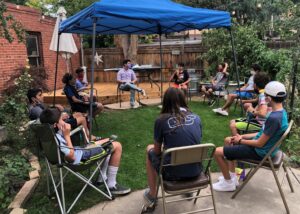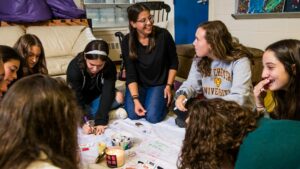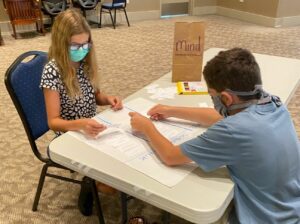Learning from Grantee-Partners: A Series on Insights from Leaders in the Field
December 10th, 2020
As a Foundation that wants to always learn—one of our internal values Hitlamdoot—we need to hear directly from leaders and practitioners in the field. Particularly at this moment, understanding what these individuals are experiencing, thinking, doing, and planning is integral to building our team’s knowledge base about the many subfields that makeup the broader world of Jewish education and engagement.
In this vein, representatives from different grantee-partners are speaking with the Foundation each month in Learning Sessions. While initially we planned for these sessions to be entirely internal, the insights and perspectives we are hearing from grantee-partners will be interesting and informative for others as well. We continue to approach our work with Kavanah, intention, to always elevate the efforts of others who help us pursue our mission. And we look forward to sharing brief recaps of each Learning Session. Read the first recap on learnings from Daniel Septimus, CEO of Sefaria, here.
As always, please let us know if you have any questions.
Learning Session Guests:
Deborah Meyer, founder and CEO, and Rabbi Tamara Cohen, VP of Program Strategy, Moving Traditions
Deborah Meyer, founder and CEO, shared the inspiration and impetus for launching Moving Traditions in 2005 with then Board Chair Sally Gottesman:
“When we started out, our concerns were focused on Jewish teen girls,” says Deborah. “Girls are at high risk of anxiety and depression as they enter adolescence. We wanted to connect Jewish teachings with social-emotional learnings from psychology and education to keep girls healthy and whole, as they enter adolescence and throughout their teen years. We wanted the Jewish community to understand the issues and social pressures that girls face in our society, and to address these issues as a core part of the Jewish education curriculum.”
After launching its Rosh Hodesh program for teen girls—and experiencing the success and demand for the program—Moving Traditions realized how important it was to offer something similar to Jewish boys. Deborah adds, “It turns out patriarchy isn’t good for boys either.” Like Rosh Hodesh, the Shevet program is a space for Jewish teen boys to come together in small groups and talk with each other and an adult male mentor about the joys and challenges of their lives.
When VP of Program Strategy Rabbi Tamara Cohen joined Moving Traditions, she created Tzelem, in collaboration with Keshet, as a third parallel group for non-binary and transgender teens. Since then, some Tzelem groups have expanded to serve any teen looking for an affirming monthly LGBTQ+ Jewish space. Today these three programs—which all blend social emotional learning, a progressive understanding of gender and society, and Judaism—are one of Moving Traditions’ suite of offerings for on its pathway to flourishing teens:

Taken together, these programs provide meaning, purpose, and health. Through these programs, and by training adults who work with teens, Moving Traditions opens a Jewish space for all teens to explore identity, gender, and the joys and challenges of adolescence.
 While the field of Jewish education and engagement today sees building mental health as essential, Moving Traditions has been pioneering this approach for 16 years. Two key learnings that deeply inform its work today are the ideas that:
While the field of Jewish education and engagement today sees building mental health as essential, Moving Traditions has been pioneering this approach for 16 years. Two key learnings that deeply inform its work today are the ideas that:
Responsive Curriculum and Teens’ Needs
In 2020, Moving Traditions conducted a rapid needs assessment to understand, in the midst of the pandemic, what teens and their families were experiencing and what they needed from congregations and other Jewish communal organizations. Moving Traditions found that teens are experiencing stress and feelings of dissociation from school—social distancing is the exact opposite of what teens need, developmentally—and the organization is concerned about long-term trauma. At the same time, teens are incredibly resilient. They are creative and they want to help their families and community, and work for social justice. “We can help teens find their outlet for making a difference,” says Tamara.
Part of what we are doing right now is trying to help teens navigate risk-taking during these hard months of the pandemic. Moving Traditions generally approaches healthy risk-taking with openness, wanting teens to learn from their good and bad decisions. With the pandemic and the heightened consequences of bad decisions, we still have to honor the agency of teens and yet, perhaps more than ever we need to help them find the right balance.
– Tamara Cohen
During the pandemic, Moving Traditions generated responsive curriculum for its teen groups on the emerging issues that matter most to teens to engage them with a sense of meaning and purpose:
Seeing that all Jewish teen educators needed curricula that were easy to use and ready to engage teens, in addition to the responsive curricula it shared widely with all Jewish educators, Moving Traditions created Heart to Heart, a five-session course of intimate conversations on key issues in teen life and in our society today. The program is a good fit for institutions looking for a way to offer engaging programming to mixed gender groups of teens in a different format than the organization’s Teen Groups. The experience offers value in and of itself and can serve as a gateway for institutions and teens to commit to Teen Groups.
By pivoting to online training, Moving Traditions trained twice the number of educators and clergy than previous years, and will continue using virtual platforms moving forward. In addition, they are addressing the needs of parents.
 Broadening Impact and Looking Ahead
Broadening Impact and Looking Ahead
“We want teens and Jewish educators to have more access to our programs,” Tamara says. “We are focused on six core cities and we would like to expand and reach more teens by partnering with more institutions throughout the country.”
To scale its work, Moving Tradition’s strategy is to leverage partnerships—with national youth groups, regional teen groups, and individual synagogues, JCCs, camps, and other local organizations. Instead of hiring staff to directly deliver its programs to Jewish youth in every region, Moving Traditions conducts research and develops resources—and then partners with local organizations to implement its programs. To ensure quality and preparedness, Moving Traditions trains its partner educators and clergy. This approach enables Moving Traditions have greater impact and to create change from within the Jewish community.
An exception to this strategy is the Kol Koleinu Feminist Fellowship, led by Moving Traditions in collaboration with URJ and USY, which now has 50 national feminist fellows in 10-12th grade. The fellowship emboldens Jewish teens to lead social change initiatives for their peers across the country. For example, in October, Kol Koleinu fellows led a three-part workshop series they created for new voters, “Voting with a Feminist Lens.”
“We are leveraging the passion of Jewish teens for social justice,” adds Tamara. “We equip Kol Koleinu Fellows with mentors and frameworks for creating changemaking projects which they implement for and with the Jewish teens in their networks. In this way we are fostering social justice leadership and Jewish engagement for this generation of teens.”
Partnering with national organizations such as URJ and USY, with regional Teen Initiatives, as well as with individual synagogues, day schools, and camps, Moving Traditions is thinking about how it can further leverage its collaborations to engage more Jewish youth across the country.
“As a result of Moving Traditions’ work, clergy and educators are joining our idea to embrace wellness and social justice activism. We are actually changing the Jewish teen curriculum. As a result, people are experiencing Judaism as a force for good.
– Deborah Meyer